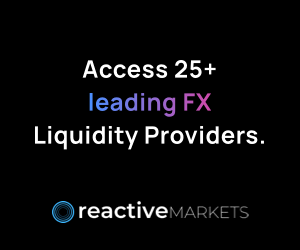Finteum Targets 2023 Launch for Intraday FX Swaps Platform
Posted by Colin Lambert. Last updated: August 8, 2023
Finteum says that “several” banks have progressed with its platform integration work ahead of going live with the system, which allows banks to trade intraday FX swaps, by the end of 2023.
The firm says 19 banking groups, with a combined balance sheet of $23.5 trillion, attended a joint trial of the software in Q2, together with observers from national prudential authorities. In the trial, over three days, participants discussed the business case and market structure for intraday markets. Finteum says attendees were a diverse group of large and midsize global organisations and included clearing banks for six different home currencies CAD, CHF, EUR, GBP, JPY and USD. Two banks have been named as UBS and NatWest.
Trades during the interbank trial were agreed in a simulated settlement environment. Real money trades are scheduled for later in 2023. The banks integrating with Finteum are going live using existing Real Time Gross Settlement (RTGS) systems for intraday FX swaps. Following requests from banks, Finteum says newly-built “capacity” functionality helps bank teams to coordinate with each other regarding how much of each currency the bank should borrow or lend, and for how many hours. Also, bank risk teams can now input intraday credit limits into the platform, to manage intraday counterparty credit risk.
Finteum observes that intraday FX swaps and repo are recognised to be an increasingly important part of liquidity management strategies at global banks – the Federal Reserve included intraday liquidity risk management as a supervisory priority for 2023 and recent bank failures have highlighted the need for banks to have access to multiple tools and sources of liquidity.
That said, perhaps the biggest opportunity for the platform is with the impending shift in US securities markets to T+1, while Europe remains at T+2. This is expected to bring short-term liquidity and funding headaches for asset managers and, potentially, banks, something that could be solved with the availability of very short-term trading instruments.
By gaining faster and better access to a currency, and by holding it for only as long as is needed, banks can meet customer obligations, reduce the HQLA required and meet increasing regulatory expectations to be able to fund payment activity in real-time
Finteum says that as there are few solutions to control the receipt of funds within a settlement window, bank treasury teams maintain large buffers of High Quality Liquid Assets (HQLA) for intraday. Holding this HQLA is increasingly expensive, due to the rising interest rate environment.
This means that banks require agile mechanisms that enable them to swiftly access and move funds when needed, the firm continues, revealing that 94% of trial participants responded to a poll saying they would most like selected intraday and overnight funding markets. The second most popular tool was central banks (facilities, FX swap lines, and liquidity bridges) at 75%. Accessing commercial bank credit lines, and throttling and payment queue reordering, were less popular at 30% or less.
“By gaining faster and better access to a currency, and by holding it for only as long as is needed, banks can meet customer obligations, reduce the HQLA required and meet increasing regulatory expectations to be able to fund payment activity in real-time,” Finteum states. “This subsequently reduces bank costs, with estimates of up $75m per year for a large bank.”
In another trial poll, Finteum says 64% of respondents believed they had adequate real-time data on their payment patterns to execute intraday trades, with others indicating they could use historical patterns instead to model regular, useful, intraday transactions.
The Finteum Platform uses R3’s Corda Enterprise distributed ledger technology (DLT) protocol. DLT enables both parties to a trade to send money and securities to each other, without needing to exchange and reconcile MT300 or similar confirmation messages. Post-trade actions such as ‘early maturity’ or cancellation of a trade are also agreed through the DLT platform. All data records are stored on a shared ledger that is only visible to the parties to the trade.
Finteum says it is building out a second wave of banks that will go live on the platform in 2024 and will start benefiting from intraday markets.




